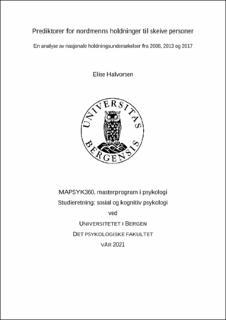| dc.contributor.author | Halvorsen, Elise | |
| dc.date.accessioned | 2021-06-04T00:02:15Z | |
| dc.date.available | 2021-06-04T00:02:15Z | |
| dc.date.issued | 2021-05-14 | |
| dc.date.submitted | 2021-06-03T22:00:04Z | |
| dc.identifier.uri | https://hdl.handle.net/11250/2757593 | |
| dc.description.abstract | Denne masteroppgaven har undersøkt prediktorer for nordmenns holdninger til skeive personer ved å analysere nasjonale, representative holdningsundersøkelser fra årene 2008, 2013 og 2017. Datamaterialet bestod av tre representative utvalg av den norske befolkningen (hvert utvalg: N=1250), hentet fra Norsk senter for forskningsdata (NSD). Kriterievariabelen var et sammensatt mål på holdninger til skeive personer som bestod av spørsmål om holdninger til tiltrekning, parforhold og seksuelle handlinger mellom likekjønnede personer. Følgende prediktorer ble valgt på grunnlag av teori og empiri: kjønn, alder, seksuell orientering, utdanningsnivå, inntektsnivå, region, kontakt med LHB-personer, religiøsitet, kjønnsnormativitet, konservativisme og partitilhørighet. Hvert datasett ble analysert med hierarkisk multippel regresjonsanalyse med tre steg for å avdekke den relative prediktive verdien av de demografiske variablene, kontakt-variabelen og standpunkt-variablene. Regresjonsmodellene forklarte 55-64% av variansen, og viste at det er en persons standpunkt til kjønnsnormer og konservative verdier som er de sterkeste prediktorene for holdninger til skeive personer. Resultatene viste at respondentene som var menn, eldre, sjelden i kontakt med skeive personer, og støttende overfor tradisjonelle kjønnsnormer viste mer negative holdninger i alle tre utvalgene. Det ble funnet varierende støtte for at seksuell orientering, religiøsitet og region kunne predikere holdninger, mens sosioøkonomisk status ikke kunne predikere holdninger i noen av utvalgene. De sterkeste prediktorene i alle utvalgene var en persons standpunkt til kjønnsnormer og konservative verdier. Funnene gir støtte for sosial identitetsteori og kontakthypotesen. I diskusjonen drøftes mulige interaksjonseffekter mellom prediktorene, forslag til neste nasjonale holdningsundersøkelse, og forslag til andre forskningsmetoder som kan gi mer innsikt befolkningens holdninger. | |
| dc.description.abstract | The aim of this master thesis was to investigate potential predictors of attitudes toward queer persons among the Norwegian population. The data material comprised of three representative samples (N=1250) of survey data on attitudes toward sexual orientations from the years 2008, 2013 and 2017. The criterion variable was a composite measure of attitudes toward same sex attraction, relationships and sexual behavior. The predictors of interest were gender, age, sexual orientation, education, income, region, contact with LGB persons, religiosity, gender normativity, conservatism and political party affiliation. The surveys were analyzed using hierarchical multiple regression with three steps in order to determine the relative predictive value of demographic variables, the contact variable and standpoint variables on attitudes. The regression models accounted for 55-64% of explained variance. The results revealed that male gender, older age, infrequent contact with LGB persons, and support for traditional gender norms were stable predictors of more negative attitudes across all three samples. The effects of sexual orientation, religiosity and region varied across the samples. Socioeconomic status could not predict attitudes in any of the samples. Overall, the strongest predictors were gender normativity and conservatism. The findings support both social identity theory and contact theory. The discussion points to possible interaction effects between the predictors, suggested improvements for the next national attitude survey, and the use of different research methods to gain a deeper understanding of attitudes to queer persons among the Norwegian population. | |
| dc.language.iso | nob | |
| dc.publisher | The University of Bergen | |
| dc.rights | Copyright the Author. All rights reserved | |
| dc.subject | prediktorer | |
| dc.subject | holdninger | |
| dc.subject | seksuell orientering | |
| dc.subject | regresjon | |
| dc.subject | skeive personer | |
| dc.title | Prediktorer for nordmenns holdninger til skeive personer. En analyse av nasjonale holdningsundersøkelser fra 2008, 2013 og 2017 | |
| dc.title.alternative | Predictors of attitudes toward queer persons among the Norwegian population. An analysis of national attitude surveys from 2008, 2013 and 2017. | |
| dc.type | Master thesis | |
| dc.date.updated | 2021-06-03T22:00:04Z | |
| dc.rights.holder | Copyright the Author. All rights reserved | |
| dc.description.degree | Masteroppgave i psykologi | |
| dc.description.localcode | MAPSYK360 | |
| dc.description.localcode | MAPS-PSYK | |
| dc.description.localcode | INTL-MED | |
| dc.description.localcode | INTL-PSYK | |
| dc.description.localcode | INTL-MN | |
| dc.description.localcode | INTL-KMD | |
| dc.description.localcode | INTL-SV | |
| dc.description.localcode | INTL-JUS | |
| dc.description.localcode | INTL-HF | |
| dc.subject.nus | 736999 | |
| fs.subjectcode | MAPSYK360 | |
| fs.unitcode | 17-35-0 | |
